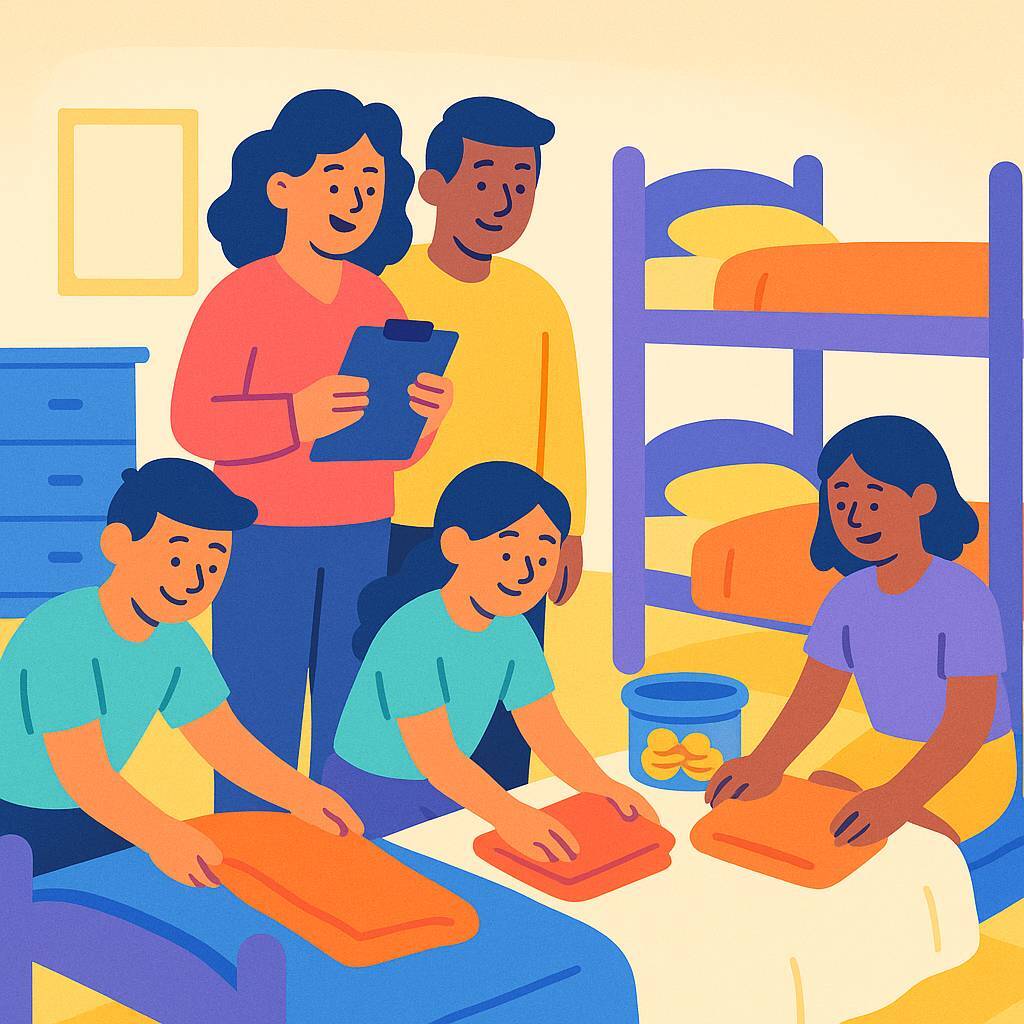TikTok’s Bunk Checks: Turning Chores Into Cash and Life Lessons
Raising kids in a house full of siblings can feel like running a small hostel. In Tennessee, Hannah Burch grew up as the youngest of five children. To stop their home from descending into chaos, her parents invented a set of rules that would make reality‑TV producers proud. Years later Burch shared their story in a viral TikTok video, and it turns out her childhood “bunk checks” and budget dinners offer a masterclass in teaching responsibility and the value of money.
The star of the show was a game her mum called “Bunk Checks.” Each morning she would march into the kids’ rooms and score them on how well the beds were made, whether clothes were folded and whether everything was put away. Brothers competed against sisters, and points were tallied at the end of each month. The winners either pocketed a small cash reward or – even better – got to choose the next family activity. Suddenly chores weren’t nagging from Mum; they were part of a team sport. Even when strangers complimented the children’s behaviour at restaurants, the kids earned an extra dollar. Competing for neatness taught them that tidying up pays off.
Money lessons didn’t stop at bed‑making. Once a month, Burch’s mum took one child to the grocery store with a $20 bill and put them in charge of planning and buying dinner for the entire family. Whatever they saved they could keep, turning a weekly chore into a budgeting lesson. One brother saved his grocery money over several months and surprised the family with a fancy steak dinner. Because gifts were rare outside birthdays and holidays, these little windfalls felt meaningful. They also taught the kids to think before spending and to appreciate delayed gratification.
Some of the house rules felt strict at the time. The children were not allowed to have a mobile phone until about fifteen, and certain TV shows were off limits. Burch admits she hated those limits when she was a teenager, but looking back she realises they gave her more time to play outside, build friendships and enjoy an extended childhood. The screen boundaries weren’t about punishment; they were about helping kids discover life beyond the glowing rectangle.
As a parent herself now, Burch plans to adopt “most, if not all” of her parents’ rules. Her story is a reminder that discipline and fun don’t have to be opposites. Turning chores into a competition gives kids ownership over their responsibilities. Letting them handle a small budget teaches them how far money really goes. Delaying phones and limiting TV buys them the gift of boredom, which sparks creativity. You don’t need five children or bunk beds to try this at home. Start a weekly points chart for making beds or clearing dishes. Hand your tween the grocery list and a set amount of cash, and let them decide how to stretch it. When we embed life lessons inside everyday routines, we raise kids who know that work is part of family life and that money is earned, not conjured out of thin air.
مصطلح «فحص السرير» على تيك توك: تحويل المهام المنزلية إلى فلوس ودروس حياة
تربية ولاد كتير تحت سقف واحد ممكن تحسسك إنك بتدير بيت شباب. في ولاية تينيسي الأمريكية، كبرت هانا بيرتش كأصغر خمسة أخوات. علشان يمنعوا البيت من إنه يتحول إلى فوضى، اخترع أهلها مجموعة قواعد تخلي منتجين برامج الواقع يغاروا. بعد سنين شاركت بيرتش قصتها في فيديو على تيك توك، واتضح إن «فحص السرير» ودروس الميزانية في طفولتها هما دروس عملية في المسؤولية وقيمة الفلوس.
نجم الحكاية كان لعبة اسمها «فحص السرير». كل يوم الصبح كانت أمها تدخل الأوض وتقيم السراير، وتشوف إذا كانت الهدوم متطبقة وكل حاجة محطوطة في مكانها. الأولاد كانوا بيتنافسوا مع البنات، وفي نهاية كل شهر بيجمعوا النقاط. الفريق اللي بيكسب ياخد مكافأة صغيرة أو – والأحلى – يختار نزهة العيلة الجاية. فجأة المواعين وترتيب السرير ما بقوش أوامر، بقت لعبة جماعية. حتى لما حد يمدح سلوكهم في مطعم، ياخدوا دولار زيادة. المنافسة على الترتيب علمتهم إن النظام بيجيب مكسب.
دروس الفلوس ما وقفتش عند ترتيب السرير. مرة كل شهر كانت الأم تاخد واحد من الأولاد للسوبر ماركت ومعاها ٢٠ دولار وتخليه مسؤول عن تخطيط وشراء العشا للعيلة كلها. اللي يوفره يحتفظ به لنفسه، وده حول المشوار الأسبوعي لحصة في الميزانية. واحد من الأخوات وفر المصروف بتاع السوبر ماركت كم شهر وفي الآخر فاجأهم بعزومة ستيكس فاخرة. بما إن الهدايا كانت نادرة بعيد عن أعياد الميلاد والمناسبات، الفلوس الصغيرة دي كان لها قيمة. الدرس كان إننا نفكر قبل ما نصرف وإن الصبر بيجيب نتيجة.
بعض القواعد كانت صارمة في وقتها. ما فيش موبايل قبل سن ١٥ تقريباً، وفيه برامج تلفزيون ممنوعة. هانا بتقول إنها ما كانتش بتحب القيود دي وقت المراهقة، لكن دلوقتي شايفة إنها ادتها فرصة تلعب في الشارع، وتبني صداقات وتستمتع بطفولة أطول. الحدود دي ما كانتش عقاب؛ كانت عشان يكتشفوا الحياة بعيد عن الشاشات.
بعد ما بقت أم دلوقتي، هانا ناوية تطبق «معظم، إن مكنش كل» قواعد أهلها. قصتها بتفكرنا إن الانضباط والمتعة مش ضد بعض. تحويل المهام لبطولة بيخلي الولاد يحسوا إنهم مسؤولين. وإدارتهم لميزانية صغيرة بيعلمهم قيمة الجنيه. تأخير الموبايل وتقليل التلفزيون بيديهم فرصة للملل، والملل بيولد الإبداع. مش لازم يكون عندك خمس أولاد أو سراير دورين عشان تجرب الفكرة. اعمل جدول نقاط أسبوعي لترتيب السراير أو ترتيب السفرة. ادي ابنك أو بنتك ليستة المشتريات ومبلغ ثابت وخليهم يقرروا يجيبوا إيه. لما نحط الدروس دي جوه الروتين اليومي، بنربي أولاد يعرفوا إن الشغل جزء من حياة العيلة وإن الفلوس بتتعمل بالمجهود، مش بتطلع من الهواء.
**Sources**:
– People via Yahoo News, “Daughter Goes Viral After Sharing Parents’ Unconventional and ‘Strict’ Childhood Rules,” Oct. 18 2025.







Leave a Reply
You must be logged in to post a comment.